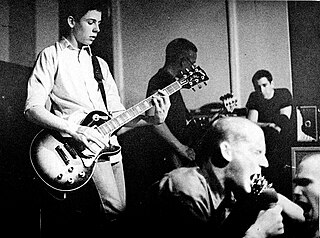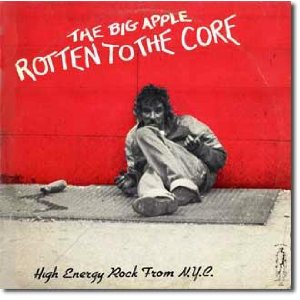Punk rock is a music genre that emerged in the mid-1970s. Rooted in 1960s garage rock, punk bands rejected the perceived excesses of mainstream 1970s rock. They typically produced short, fast-paced songs with hard-edged melodies and singing styles, stripped-down instrumentation, and often political, anti-establishment lyrics. Punk embraces a DIY ethic; many bands self-produce recordings and distribute them through independent record labels.

Hardcore punk is a punk rock music genre and subculture that originated in the late 1970s. It is generally faster, harder, and more aggressive than other forms of punk rock. Its roots can be traced to earlier punk scenes in San Francisco and Southern California which arose as a reaction against the still predominant hippie cultural climate of the time. It was also inspired by New York punk rock and early proto-punk. New York punk had a harder-edged sound than its San Francisco counterpart, featuring anti-art expressions of masculine anger, energy, and subversive humor. Hardcore punk generally disavows commercialism, the established music industry and "anything similar to the characteristics of mainstream rock" and often addresses social and political topics with "confrontational, politically-charged lyrics."
Emo is a rock music genre characterized by an emphasis on emotional expression, sometimes through confessional lyrics. It emerged as a style of post-hardcore from the mid-1980s hardcore punk movement in Washington, D.C., where it was known as emotional hardcore or emocore and pioneered by bands such as Rites of Spring and Embrace. In the early–mid 1990s, emo was adopted and reinvented by alternative rock, indie rock and pop punk bands such as Sunny Day Real Estate, Jawbreaker, Weezer and Jimmy Eat World, with Weezer breaking into the mainstream during this time. By the mid-1990s, bands such as Braid, the Promise Ring and the Get Up Kids emerged from the burgeoning Midwest emo scene, and several independent record labels began to specialize in the genre. Meanwhile, screamo, a more aggressive style of emo using screamed vocals, also emerged, pioneered by the San Diego bands Heroin and Antioch Arrow. Screamo achieved mainstream success in the 2000s with bands like Hawthorne Heights, Silverstein, Story of the Year, Thursday, The Used, and Underoath.
Indie rock is a genre of rock music that originated in the United States and United Kingdom in the 1970s. Originally used to describe independent record labels, the term became associated with the music they produced and was initially used interchangeably with alternative rock or "guitar pop rock". In the 1980s, the use of the term "indie" started to shift from its reference to recording companies to describe the style of music produced on punk and post-punk labels. During the 1990s, grunge and punk revival bands in the US and Britpop bands in the UK broke into the mainstream, and the term "alternative" lost its original counter-cultural meaning. The term "indie rock" became associated with the bands and genres that remained dedicated to their independent status. By the end of the 1990s, indie rock developed several subgenres and related styles, including lo-fi, noise pop, emo, slowcore, post-rock, and math rock. In the 2000s, changes in the music industry and a growing importance of the Internet enabled a new wave of indie rock bands to achieve mainstream success, leading to questions about its meaningfulness as a term.
Alternative rock is a category of rock music that emerged from the independent music underground of the 1970s and became widely popular in the 1990s. "Alternative" refers to the genre's distinction from mainstream or commercial rock or pop music. The term's original meaning was broader, referring to a generation of musicians unified by their collective debt to either the musical style or simply the independent, DIY ethos of punk rock, which in the late 1970s laid the groundwork for alternative music.
Pop-punk is a rock music genre that combines the textures and fast tempos of punk rock with the melodies and chord progressions of power pop. It is defined for its emphasis on traditional pop songcraft and adolescent and anti-suburbia themes, and is distinguished from other punk-variant genres by drawing more heavily from 1960s pop rock and the music of bands such as the Beatles, the Kinks, and the Beach Boys.
Ska punk is a fusion genre that mixes ska music and punk rock music together. Ska-core is a subgenre of ska punk that mixes ska with hardcore punk. Early ska punk mixed both 2 Tone and ska with hardcore punk. Ska punk tends to feature brass instruments, especially horns such as trumpets, trombones and woodwind instruments like saxophones, making the genre distinct from other forms of punk rock. It is closely tied to third wave ska which reached its zenith in the mid 1990s.
Skate punk is both a skater subculture and a subgenre of punk rock music. Originally a genre of hardcore punk closely associated with skate culture, skate punk changed into a more melodic genre of punk rock in the 1990s. Since the 1990s, skate punk has been a genre that features fast tempos, lead guitar playing, fast drumming, and singing. Featuring the fast tempos of hardcore punk and melodic hardcore, skate punk occasionally combines these with the catchy hooks of pop punk. Skate videos have traditionally featured this fast style of punk rock. This played a big part in the coining of the term "skate punk".

Dicks were an American punk rock band from Austin, Texas, formed in 1980 and initially disbanded in 1986. After the first breakup, singer Gary Floyd formed the band Sister Double Happiness, with drummer Lynn Perko, then later fronted a project called Black Kali Ma. In 2004, The Dicks reunited and were active until 2016.

Flipper is an American rock band formed in San Francisco, California in 1979, continuing in often erratic fashion until the mid-1990s, then reuniting in 2005. The band influenced a number of grunge, punk rock and noise rock bands. Their slowed-down, bass-driven and heavily distorted style of punk is considered to have inspired bands such as the Melvins and Nirvana, whose bass player Krist Novoselic played with the band in the 2000s.
A cult following refers to a group of fans who are highly dedicated to a piece of artwork in various media, often referred to as a cult classic. A film, book, musical artist, television series, or video game, among other things, is said to have a cult following when it has a small but very passionate fanbase. A common component of cult followings is the emotional attachment the fans have to the object of the cult following, often identifying themselves and other fans as members of a community. Cult followings are also commonly associated with niche markets. Cult media are often associated with underground culture, and are considered too eccentric or subversive to be appreciated by the general public or to be commercially successful.
Post-hardcore is a punk rock music genre that maintains the aggression and intensity of hardcore punk but emphasizes a greater degree of creative expression initially inspired by post-punk and noise rock. Like post-punk, the term has been applied to a broad constellation of groups. Post-hardcore began in the 1980s with bands like Hüsker Dü and Minutemen. The genre expanded in the 1980s and 1990s with releases by bands from cities that had established hardcore scenes, such as Fugazi from Washington, D.C. as well as groups such as Big Black and Jawbox that stuck closer to post-hardcore's noise rock roots. In the 2000s, post-hardcore achieved mainstream success with the popularity of bands like My Chemical Romance, Dance Gavin Dance, AFI, Underoath, Hawthorne Heights, The Used, At the Drive-In and Senses Fail. In the 2010s, bands like Sleeping with Sirens and Pierce the Veil, both of which being labeled as post-hardcore, achieved mainstream success. Meanwhile, bands like Title Fight and La Dispute experienced underground popularity.
Touch and Go Records is an American independent record label based in Chicago. After its genesis as a handmade fanzine in 1979, it grew into one of the key record labels in the American 1980s underground and alternative rock scenes. Touch & Go carved out a reputation for releasing adventurous noise rock by the likes of Big Black, the Butthole Surfers, and The Jesus Lizard. Touch & Go helped to spearhead the nationwide network of underground bands that formed the pre-Nirvana indie rock scene, and helped preside over the shift from the hardcore punk that then dominated the American underground scene to the more diverse styles of alternative rock emerging at the time.

(GI) is the only studio album by American punk rock band the Germs. Often considered the first hardcore punk album, it was released in the United States in October 1979 on Slash Records with catalog number SR 103. The album was later released in Italy in 1982 by Expanded Music with the catalog EX 11. The album's title is an acronym for "Germs Incognito", an alternate name the band used to obtain bookings when their early reputation kept them out of Los Angeles-area clubs. After (GI)'s release, the band would only undertake one more recording session, for the soundtrack album to Al Pacino's 1980 film Cruising. A year after the release of (GI), on December 7, 1980, vocalist Darby Crash killed himself.

This Is Boston, Not L.A. is a hardcore punk compilation released in 1982. It is considered the definitive album from the Boston hardcore scene, as several of its most prominent bands appear on the record, namely, Jerry's Kids, the Proletariat, the Groinoids, the F.U.'s, Gang Green, Decadence, and the Freeze. For them, with the exception of the later, This Is Boston, Not L.A. was also their debut release. Al Barile's band, SSD, were asked to contribute, but they refused to participate.

Group Sex is the debut studio album by American hardcore punk band Circle Jerks. It was released on October 1, 1980, by Frontier Records. The album consists of 14 songs in 15 minutes and is considered to be a landmark album in hardcore punk. It was included in the book 1001 Albums You Must Hear Before You Die.

The Big Apple Rotten to the Core is a hardcore punk compilation album that was released in 1982. It was the second release by S.I.N. Records, and distributed internationally. Produced by Bob Sallese. It was one of the first hardcore punk compilations from New York City, and included six bands who regularly performed at A7, a Lower East Side after-hours dive bar that gave the new hardcore bands a forum.
Punk rock and hardcore punk in Brazil originated in the late 1970s, influenced by bands such as Sex Pistols, The Clash, Stiff Little Fingers and The Ramones. The first known Brazilian punk rock band was Restos de Nada, which appeared in mid-1978 and set the stage for the emergence of many other bands that formed the scene Brazilian punk scene.

Red Cross, a six-song punk rock EP record, is the first stand-alone release by American rock band Red Cross.
The Philadelphia punk scene refers to the vibrant punk rock scene created in Philadelphia, Pennsylvania.







